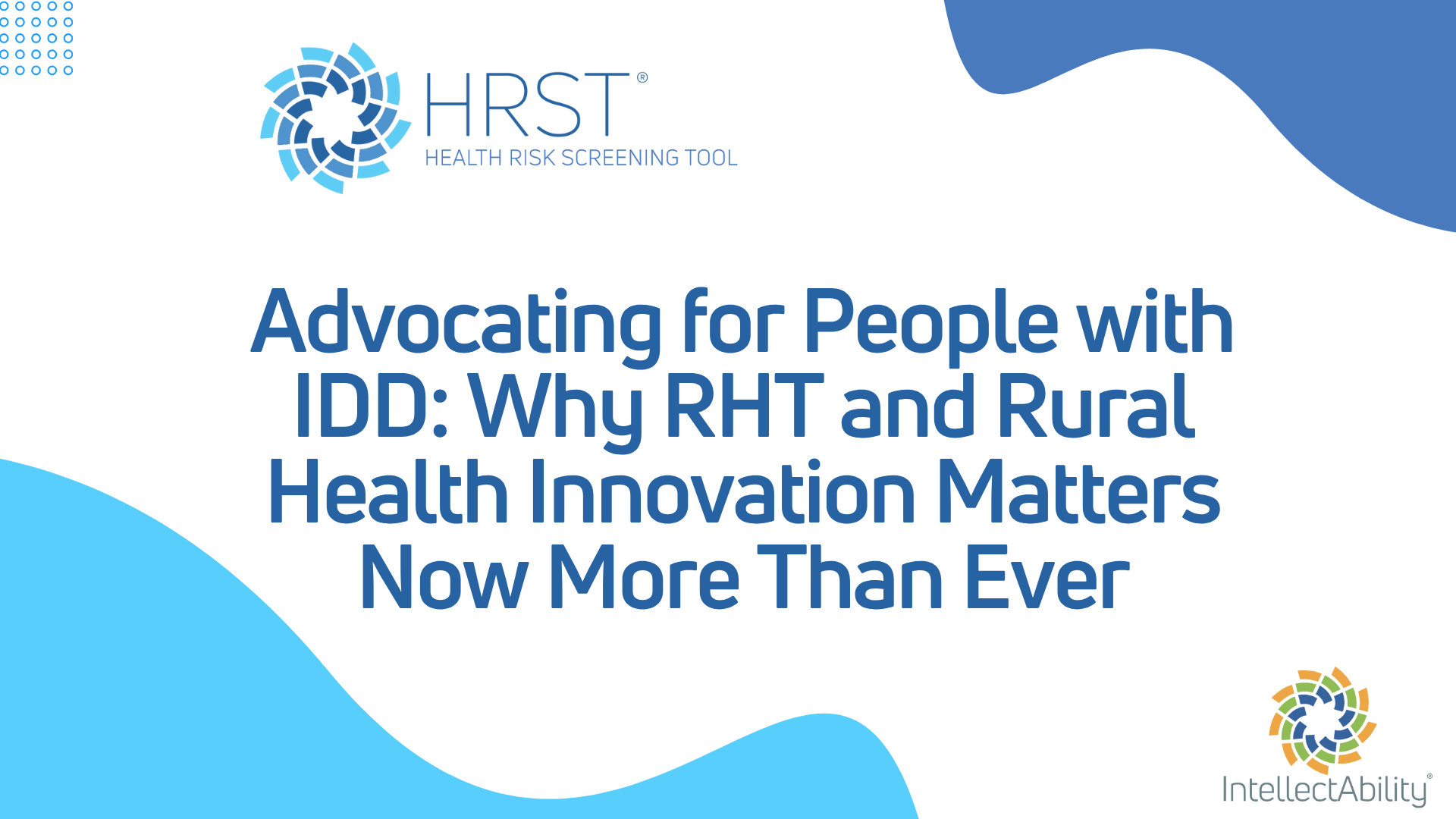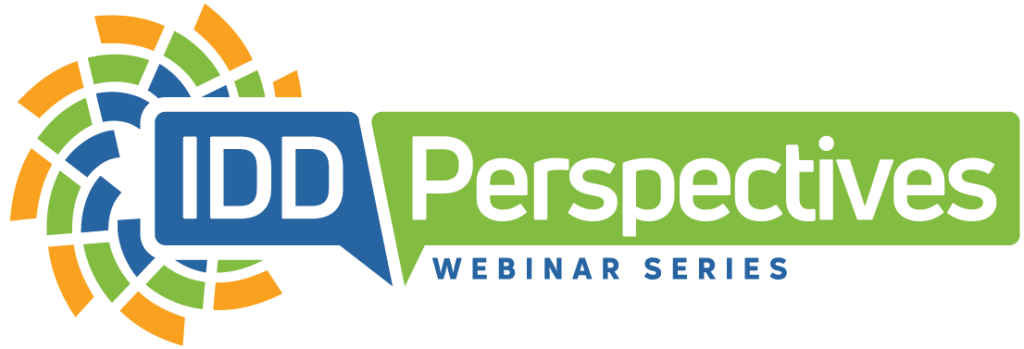
Advocating for People with IDD: Why RHT and Rural Health Innovation Matters Now More Than Ever
In the quiet corners of rural America, far from metropolitan health centers and bustling medical campuses, there are people with intellectual and developmental disabilities (IDD) whose voices too often go unheard, whose lives are shaped by gaps in care that others may not even see. People with IDD experience health disparities compared to the general population, with these inequities often being more pronounced in rural areas where access to quality healthcare is limited.
At IntellectAbility, we believe that everyone — no matter where they live — deserves more than just survival. Addressing health disparities for people with IDD, especially in rural areas, is essential to ensuring they receive equitable care. They deserve health, wellness, dignity, and the chance to live a life they love.
Why we care:
Our story began with a simple but powerful truth: health and wellness flourish when uncertainty, misinformation, and risk are replaced by insight, training, and intentional support. For people with IDD, this truth is especially pressing because the margins of risk are narrower, the stakes are higher, and systemic failures too often lead to tragedy.
When you’re living in a rural community, the challenges multiply: fewer specialist providers, longer travel distances, limited provider experience in IDD, and fewer supports.
As the recent announcement of the Rural Health Transformation (RHT) Program, authorized by the Big Beautiful Bill Act, highlights, this moment could bring a real shift. The investment is not only in bricks and mortar but also points to the possibility of change in healthcare access, innovation, and workforce development. The RHT Program aims to improve healthcare delivery and healthcare access in rural communities, which directly addresses the unique needs of people with IDD.
For IntellectAbility, this also means ensuring that people with disabilities are not left behind, emphasizing the importance of health equity and the need for the healthcare system to address disparities for people with disabilities.
The gap we see for individuals with intellectual and developmental disabilities:
Time and again, we’ve seen providers and support teams say: “We knew something wasn’t right, but we didn’t have the right tools or data to act.” Too often, a change in condition, an underlying health risk, or a subtle behavioral sign goes unnoticed until it becomes a crisis.
The result? Preventable hospitalizations. Unnecessary suffering. Excessive costs, including increased administrative costs. Lives that could have been different.
These issues negatively impact health outcomes and highlight the urgent need to improve the quality of care. Emphasizing preventative care and disease prevention for people with IDD is essential to reduce these avoidable events. There is a clear need for more resources and research to support better care for people with IDD.
Here’s where we get personal: our founder, Karen Green McGowan, entered the field because she refused to accept that people with IDD had to live in conditions of neglect or oversight. Her work formed the backbone of what became the Health Risk Screening Tool (HRST®): a method of early warning, a way to replace risk with health and wellness. That has remained at the heart of everything we do at IntellectAbility.
Why this federal initiative matters and how you can leverage it:
With rural health receiving a meaningful boost through the RHT Program, earmarked to invest $50 billion over the fiscal years 2026 to 2030, the role of technology-enabled tools (like our Health Risk Screening Tool (HRST®)), training of rural clinicians (using our Curriculum in IDD Healthcare), and integrated approaches to prevention and population health are at the forefront.
For State Medicaid and Developmental Disabilities Directors, agencies, provider networks, and healthcare providers who serve people with IDD, this is a pivotal moment. Medicaid programs and covered services are essential for ensuring access to a full range of services, and changes in federal legislation can significantly impact state budgets and the ability to deliver comprehensive care.
Imagine: a rural case manager equipped not just with experience or intuition but with validated health-risk data. A provider team that can pull up dashboards, see risk trends, and respond proactively, with resources available to healthcare providers to support data-driven decision-making. A system where a person with IDD doesn’t have to wait until their next crisis to get the support they need.
That’s what we’re advocating for, and what we’re offering.
When you adopt the HRST, you are not getting just another piece of software. You’re embracing a paradigm shift in how health risk is viewed and addressed for people with IDD. You’re centering their lives, their supports, their voices, and giving your staff the tools they need to act, rather than react.
The benefits of providing access to primary care, specialty care, and behavioral health services for people with IDD are clear: improved health outcomes, greater independence, and enhanced quality of life.
A call to action for state and agency leaders:
If you are a director in a state developmental disabilities agency, in a Medicaid office, or in a provider network, serving rural communities and people with IDD: this is your moment. Invest now in tools and training that will enable your teams to detect risk earlier, plan for long-term care and service needs, intervene meaningfully, reduce ER visits and hospitalizations, and most importantly, support people with IDD in living lives of purpose, wellness, and connection. Addressing mental health, mental health services, and behavioral health is essential for people with IDD to ensure comprehensive care and early intervention.
Let’s make sure that when history looks back on this era of rural health transformation, the stories are not just about dollars invested or clinics built, but about lives changed—promoting well-being for patients and their family members. That includes people with IDD and the range of services available to support them.
Why we’re committed:
At IntellectAbility, our purpose goes beyond risk reduction. Our mission is clear: We provide tools and training to those who support people with vulnerabilities, helping them replace risk with health and wellness. Education and research are essential to improving outcomes for people with developmental disability and intellectual disability, and we are committed to advancing both.
For too long, the narrative about people with IDD has been about what they can’t do or the risks they face. We’re flipping that narrative, focusing on what they can do, who they are, and how systems can better support them, including those with intellectual disability and developmental disability.
We believe in possibility. We believe in potential. We believe that when support teams, clinicians, administrators, and leaders are equipped with resources and training, and supported by public health initiatives for people with disability, anything is possible for people with IDD.
If you’d like to explore how the HRST and our learning platform can help your team transform care in rural settings, let’s talk. Because the people we serve, and the supporters who serve them, deserve nothing less.
Additional Resources
- To learn more about the HRST, download our HRST Brochure.
- To discover the cost-saving benefits of the HRST, download the Optimizing HCBS & Healthcare Spending for People with IDD During Medicaid Cuts white paper.
- To view our online staff training options, download our Academy Brochure or visit our webpage.




